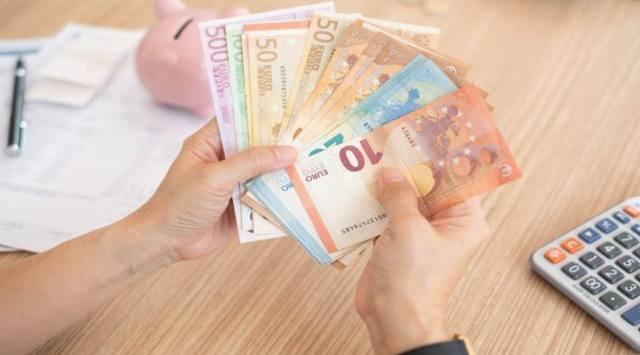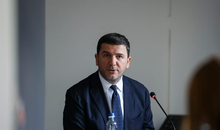
 Flash News
Flash News
Accident at "Shkalla e Tujanit", truck overturns in the middle of the road, driver injured
Vlora by-pass, work delays and cost increases
Milan are expected to give up on the transfer of Granit Xhaka
Inceneratori jashtë funksionit, përfshihet nga flakët fusha e mbetjeve në Elbasan
Accident on the Lezhë-Shëngjin axis, one injured
The euro fell, but in 2024, 2.3 times more currency left Albania than a year earlier

The current account deficit worsened last year. According to data from the Bank of Albania, the deficit reached 607 million euros, an increase of 157% compared to 2023.
This means that about 5.6 billion euros left the country, mainly for the purchase of imported products, while about 5 billion euros entered in the form of emigrant transfers, exports, tourist arrivals, income from work abroad, etc. In 2024, the deficit had decreased to only 263 million euros (4.53 billion euros of foreign exchange outflow and 4.27 billion euros of foreign exchange inflow).
The last quarter of 2024 also resulted in a significant increase in the current account deficit, amounting to 232 million euros, 55% more compared to the same period a year earlier.
The main effect on the increase in the current account deficit for 2024 was the deepening of the trade deficit in goods. The goods trade deficit last year reached almost 5.6 billion euros, an increase of 23% compared to the previous year.
The trade balance in services improved again in 2024, but insufficiently to fill the "hole" of the deficit in trade in goods.
The external account in services last year was positive at a value of almost 3.9 billion euros, up 15% compared to the previous year.
The vast majority of the surplus in services came from tourism. Statistics showed that net income in the travel item of the Balance of Payments was worth 2.3 billion euros, up 25% compared to 2023.
But while tourism continued to increase its positive contribution to the balance of payments, income from tourism declined. Net income from services for the processing of physical inputs owned by others fell to 662 million euros, 14% less than a year earlier.
Excluding the pandemic year 2020, this is the first decline in tailoring revenues since 2013. The tailoring sector has been hit hard in recent years by the strong appreciation of the lek against the euro. This appreciation has continued throughout 2024, and the exchange rate has reached new historical records in decline, near the 98 lek mark.
Remittances once again contributed to the growth in the current account balance. Last year, emigrant remittances reached 1.045 billion euros, an increase of 12.5% compared to the previous year.
New waves of Albanian emigration in recent years have revived remittances, positively impacting the country's current account balance. High inflation and the decline in the Euro exchange rate over the past two years may also have encouraged the growth of remittances, enabling the preservation of the purchasing power of families dependent on them.
Despite the current account balance deteriorating significantly last year, the Euro-Lek exchange rate continued to decline. The average exchange rate fell by 7.4% compared to the previous year. One euro was exchanged for an average of 100.7 Lek in 2024, down from 108.7 Lek a year earlier, falling to a historical low. Meanwhile, the Bank of Albania purchased approximately 933 million euros in the domestic foreign exchange market in 2024.
Final data released by the central bank showed that foreign exchange purchases last year reached a historic high. The amount of foreign exchange purchased increased by 249% compared to the previous year. But even these purchases failed to stem the euro's decline.
However, the current account deficit continues to be covered by inflows to the financial account, mainly foreign direct investments. According to data from the Bank of Albania, they amounted to 1.58 billion euros, up 5.6% compared to a year earlier./ Monitor
Latest news


Horoscope, what do the stars have in store for you today?
2025-07-02 08:13:36
Hot weather, Wednesday brings high temperatures
2025-07-02 07:59:16
Morning Post/ In 2 lines: What mattered yesterday in Albania
2025-07-02 07:46:15
Heatwave sweeps across Europe, Spain and England record hottest June ever
2025-07-01 22:57:41






Golem and Qerret without water at the peak of the tourist season
2025-07-01 21:09:32

Euractiv: Italy-Albania migrant deal faces biggest legal challenge yet
2025-07-01 20:53:38
BIRN: Brataj and Fevziu victims of a 'deepfake' on Facebook
2025-07-01 20:44:00

Vlora by-pass, work delays and cost increases
2025-07-01 20:24:29



Milan are expected to give up on the transfer of Granit Xhaka
2025-07-01 19:41:25


The silent but rapid fading of the towers' euphoria
2025-07-01 18:58:07
Donald Trump's daughter says 'goodbye' to June with photos from Vlora
2025-07-01 18:48:47

Tirana vote recount, Alimehmeti: CEC defended manipulation
2025-07-01 18:15:05

Left Flamurtari, striker signs with another Albanian club
2025-07-01 17:43:14
Accident on the Lezhë-Shëngjin axis, one injured
2025-07-01 17:19:35
June temperature records, Italy limits outdoor work
2025-07-01 17:03:15

Meet Kozeta Miliku, named one of the top five scientists in Canada
2025-07-01 16:32:12
"Arsonist" arrested for repeatedly setting fires in Vlora (NAME)
2025-07-01 16:29:45

The ecological integrity of the Vjosa River risks remaining on paper
2025-07-01 16:09:40
Heat Headache/ Causes, Symptoms and Measures You Should Take
2025-07-01 16:01:13
UN: The world must learn to live with heat waves
2025-07-01 15:54:50

Three cars collide in Tirana, one of them catches fire
2025-07-01 15:38:16

Shehu: Whoever doesn't want Berisha, doesn't want the opposition 'war'!
2025-07-01 15:19:20
Berisha requests the OSCE Assembly: Help my nation vote freely
2025-07-01 15:11:46
Be careful with medications: Some of them can harm your sex life
2025-07-01 15:00:32

'Golden Bullet'/ Lawyers leave the courtroom, Altin Ndoc's trial postponed again
2025-07-01 14:44:52
EU changes leadership, Kosovo in a number of places
2025-07-01 14:40:01
Should we drink a lot of water? Experts are surprised: You risk hyponatremia
2025-07-01 14:30:20



Lëpusha beyond Rama's postcards: A village that is being silently abandoned
2025-07-01 13:41:56
Scorching temperatures in France close the Eiffel Tower
2025-07-01 13:29:35
Media: China, Iran and North Korea, a threat to European security
2025-07-01 13:20:12
Albania drops in global index: Less calm, more insecure
2025-07-01 13:09:35
Road collapses, 5 villages in Martanesh risk being isolated
2025-07-01 13:03:04

Këlliçi: Opposition action to be decided in September
2025-07-01 12:48:49
Four tips for coping with the heat wave
2025-07-01 12:38:53
Car hits pedestrian on Transbalkan road
2025-07-01 12:27:09
Authors of 9 robberies, Erjon Sopoti and Abdullah Zyberi arrested
2025-07-01 12:15:56

He abused his minor daughter, this is a 36-year-old man in custody in Fier
2025-07-01 11:50:34
The constitution of the Kosovo Assembly fails for the 40th time
2025-07-01 11:40:08




EU confirms support for the Western Balkans
2025-07-01 10:50:45
Serious in Fier! Father sexually abuses his minor daughter
2025-07-01 10:32:33
One year since the passing of the colossus of Albanian literature, Ismail Kadare
2025-07-01 10:25:26


They supplied the 'spaçators' with drugs, two young men are arrested in Tirana
2025-07-01 09:54:09
Europe is "scorching", how dangerous are high temperatures?
2025-07-01 09:48:56


Nigel Farage in Albania: but why?
2025-07-01 09:13:12
Xama: The "Partizani" dossier is quite weak and without facts!
2025-07-01 09:04:47

Foreign exchange, the rate at which foreign currencies are sold and bought
2025-07-01 08:35:39
Fabricators again warn of factory closures and job cuts
2025-07-01 08:21:30
Horoscope, what do the stars have in store for you today?
2025-07-01 08:08:59
Scorching hot, temperatures reaching 40°C
2025-07-01 07:57:12
Morning Post/ In 2 lines: What mattered yesterday in Albania
2025-07-01 07:42:59
Recount after May 11, Braho: I had no expectations for massive vote trafficking
2025-06-30 22:54:18

Second hearing on the protected areas law, Zhupa: Unconstitutional and dangerous
2025-06-30 22:18:46



Israel-Iran conflict, Bushati: Albanians should be concerned
2025-06-30 21:32:42

Fuga: Journalism in Albania today in severe crisis
2025-06-30 21:07:11
"There is no room for panic"/ Moore: Serbia does not dare to attack Kosovo!
2025-06-30 20:49:53

Temperatures above 40 degrees, France closes nuclear plants and schools
2025-06-30 20:28:42
Lavrov: NATO is risking self-destruction with new military budget
2025-06-30 20:13:54
Turkey against the "Bektashi state" in Albania: Give up this idea!
2025-06-30 20:03:24
